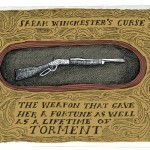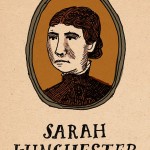The animator who’s made films about drones, plagiarism, and talking whales turns his sights on guns. Guns, guns, guns.
 By Charles Mudede, The Seattle Stranger
By Charles Mudede, The Seattle Stranger
Drew Christie hates guns. He didn’t grow up around them, he doesn’t understand why so many people love them, and he doesn’t want them in his house. Guns just kill people. That’s what they do best. And if you own one, it’s more likely to harm you or someone you love than protect you or someone you love from some burglar. Christie (beer in one hand, sketchbook in another, sun in the sky) was saying these things to me as we sat on the porch of his Central District home. The house is yellow and huge, and it was first owned in the old times by a tobacco merchant. In the 1960s, it became a home for nuns. Now it’s where he sleeps, eats, and does art.
But who exactly is Christie? He is a local filmmaker and animator whose work appears regularly in the New York Times‘ Op-Docs series. A short film of his, Song of the Spindle, screened at Sundance in 2012. Also in 2012, he was a finalist for a Stranger Genius Award in film. Because his films involve a lot of historical, social, and scientific facts, Christie is constantly researching this and that neglected or forgotten part of American culture. His current but not complete animation project about the cultural history of guns—working title: The Haunting of America—was under way even before Newtown returned gun control to the center of mainstream politics.
Three things in his research so far have caught Christie’s imagination: One, the NRA’s idea of Second Amendment rights actually came from the Black Panthers. Two, many of the towns in the Wild, Wild West actually had more gun-control laws than cities do today. And three: There is no more potent symbol of the United States today than Sarah Winchester, the heiress of the Winchester Repeating Arms Company, who kept adding rooms to her mansion because she feared its completion would fatally expose her to the ghosts of people killed by the guns her family manufactured.
The Black Panthers Are the Forefathers of the Right-Wing Gun Nuts
This is not an exaggeration. Look at the Second Amendment: “A well regulated Militia, being necessary to the security of a free State, the right of the people to keep and bear Arms, shall not be infringed.” For most of American history, the “well regulated militia” part was not ambiguous or ignored, as it is today. Gun ownership was really about the mobilization of a citizen army. But, as Adam Winkler and other historians have explained, it was the Black Panthers who first really confused this understanding by claiming that the Second Amendment was about private rights rather than the rights of militias. On May 2, 1967, the Black Panthers showed up at the California statehouse with their guns. In 1968, Ronald Reagan, with the support of the NRA, signed the Gun Control Act in response to the Black Panthers’ boldness. (The NRA’s motto at the time was “Firearms Safety Education, Marksmanship Training, Shooting for Recreation.”) It was not until 1977, when the old NRA was replaced by the gun-nutty one we have today, that the Black Panthers’ position on gun ownership was adopted by the NRA, by dropping the “militia” bit. The NRA’s motto became “The Right of the People to Keep and Bear Arms Shall Not Be Infringed.”
Dodge City Guns
During our conversation on the porch, Christie explained that whenever you talk to a gun nut, he or she eventually begins to go on about the good old days, the days of the Wild, Wild West, when citizens had lots of gun freedoms. But this is a complete fantasy. It’s not how it was at all. Towns like Dodge City, Kansas, actually had signs that ordered visitors to “leave your guns at the sheriff’s office.” The police and town officials knew that guns in a populated place, a place with lots of bars and gambling, was a recipe for disaster. Christie’s point? The gun laws we have in our cities today are actually more relaxed than the ones they had in 19th-century boomtowns.
Sarah Winchester and the Ghosts
Poor Sarah Winchester. Fearing that her gun-manufacturing family had been cursed after the untimely deaths of her husband and child, she turned to a psychic in Boston for advice (this was in the early 1880s). The psychic confirmed her fears. There was indeed a curse on her family. The ghosts of the people who had been killed by Winchester rifles would kill her if she did not move west and build a house that perpetually confused them. Sarah moved west and began building this house, room after room, to keep the murderous ghosts away from her life. The construction only stopped with her death in 1922. Christie sees this terrible story as a metaphor for American society today. “We profited from all these guns, we made all this money,” he explained as he drank beer, “and now the guns are everywhere. Now we can’t get rid of them. Now they are turning on us. Now they are killing our children, our friends, our families. We all live in Sarah’s haunted house.”
